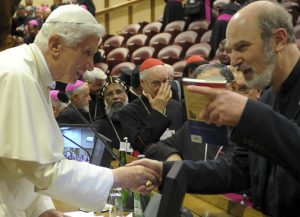Introduction
Pope Benedict always understood theology as the interpretation of Scripture and as thinking that comes from Jesus Christ and is toward Jesus Christ. Thomas Söding has aptly written with respect to Deus caritas est and its author,
“Papal theology has arguably left its mark on the genre of the encyclical: It begins programmatically with a quote from Scripture and in a qualified sense is an interpretation of Scripture.”

Pope Benedict XVI. with Thomas Schirrmacher
This “Bible-and-Jesus” Pope did not coincidentally write a trilogy on the Gospels and about Jesus. In the process, the Pope’s exegesis has astonishing parallels to present-day Evangelical exegesis in scholarly commentaries, in particular to those who conduct intensive historical research but, at the same time, ascribe a high degree of historical credibility to the Scriptures. It is no wonder that Pope Benedict has received much approval, indeed even praise, from the Evangelical world.
Indeed, Paul Basse has written,
“As a result, he does not see his late Magnum Opus as an epochal and ultimate Jesus book but rather only as the last contribution to an ongoing debate in which he almost in the form of a will and testament urges to trust the books and testimonies of the gospel and the writings of the fathers and saints in their sum total at least as much as all the efforts of generations of theologians who have struggled with this.”
However, the radical fashion in which the Pope then attacks the prevailing views of liberal theological scholarship – in everything which we have to differentiate and qualify below – is made clear by the following quotation, the context of which will be dealt with shortly:
ProMundis-Texte_03-2021_Benedicts_Jesus_Trilogy“And the anti-Christ, with an air of scholarly excellence, tells us that any exegesis that reads the Bible from the perspective of faith in the living God, in order to listen to what God has to say, is fundamentalism; he wants to convince us that only his kind of exegesis, the supposedly purely scientific kind, in which God says nothing and has nothing to say, is able to keep abreast of the times” (I, 36; emphasis in original).
Leave a Reply